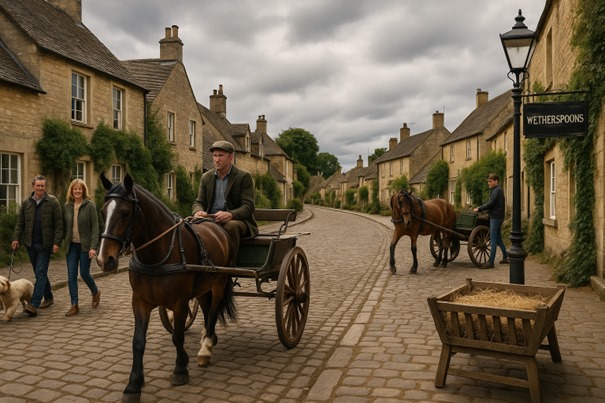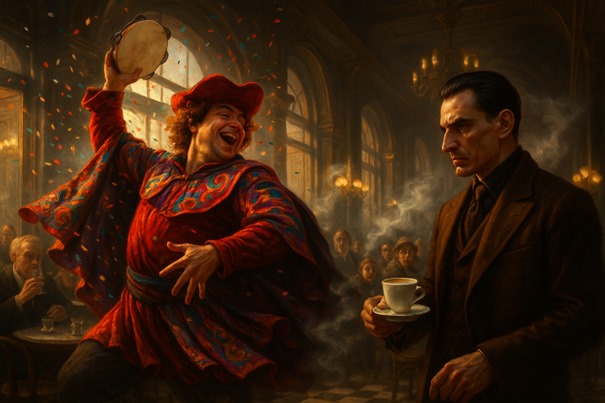In an age of AI-driven vehicles, urban congestion, and climate anxiety, perhaps the most radical transportation idea is also the oldest: what if the future of mobility is a return to the past? What if Britain — land of hedgerows, cobblestone lanes, and stoic sarcasm — ditched the petrol and plug-ins and fully embraced horses and carts once again?
It sounds absurd at first glance. But upon closer inspection, the argument for hoof over horsepower may be stronger than we think.
The High Cost of Convenience
Let's be honest: owning a car in the UK is a wallet-burning, soul-crushing experience. Between the sky-high insurance premiums, ever-rising fuel costs, road tax, MOTs, parking permits, congestion charges, and the existential threat of a pothole in Croydon, the "convenience" of car ownership is starting to look more like collective masochism.
Add to that the growing complexity of EV infrastructure — cables, home charging ports, range anxiety — and you start to wonder if maybe a creature that runs on hay and oats wasn't such a bad idea after all.
A horse doesn't require a firmware update. It won't suddenly stop working because your app needs an update. And if it does "break down," you don't need a certified technician — just a vet and a bag of apples.
Sustainability on Four Legs
Cars pollute. Even electric ones. The mining of lithium, production of batteries, and energy demands of large-scale charging all come with environmental baggage.
Horses, on the other hand, run on renewable energy — grass. They emit carbon in the form of... well, natural fertilizer. In fact, every horse is a mobile composting unit, offering side benefits for agriculture and urban gardening.
You don't need petrol stations — just a patch of land and maybe a small trough. They don't leak oil. They don't clog up the Thames. And they definitely won't be involved in self-driving AI malfunctions that mistake a traffic cone for a pedestrian.
Traffic Slowed. Society Sped Up.
One of the odd ironies of modern life is that the faster we travel, the less time we seem to have. In a world of 70mph motorways, we're constantly rushing — and perpetually late. Bringing back horses would literally slow society down, but perhaps in doing so, it would speed us up where it matters: presence, connection, awareness.
Imagine London with no horns, no fumes, no endless sirens. Just the gentle rhythm of hooves and the occasional whinny.
We could re-learn patience. Rediscover the art of conversation during travel. Maybe even revive the long-lost British tradition of polite small talk with strangers, something impossible when boxed in by glass and steel.
The National Identity Argument
Let's face it: there's something deeply British about horses and carts. They conjure images of cobbled villages, market squares, country lanes, and flat caps. They align perfectly with the national obsession for heritage, eccentricity, and refusing to do things the easy way.
Is it not more dignified to trot through the Cotswolds behind a noble shire horse than to crawl through traffic in a leased Kia?
If France has its wine and Italy its Vespas, why shouldn't Britain fully lean into its muddy, hay-scented legacy?
Objections and Rebuttals
"But horses poop," critics say.
Yes — but so do dogs. We already pick that up. Why not extend the courtesy to transportation?
"They're slow."
Good. You shouldn't be doing 50mph through a village anyway.
"They take up space."
So do SUVs. At least a horse doesn't need 12 parking sensors to reverse.
"They're expensive."
Ever priced an oil change at a London dealership?
A Vision for a Horse-Powered Future
Picture it: 2035. The UK's urban planning shifts to accommodate communal stables. Cart lanes replace bus lanes. Hay subsidies are introduced. Farmers prosper again. TikTok trends feature horse grooming tutorials. Teenagers learn how to parallel-park a cart. Wetherspoons installs hitching posts.
And in Parliament, ministers debate hay tariffs while arriving in saddle, not sedan.
Conclusion: Time to Rein the Engines
Cars promised freedom — but delivered congestion, pollution, and an arms race of gadgets no one asked for. Horses, while slower and smellier, offer something strangely radical in 2025: simplicity.
It's time we stopped pretending that technological progress always equals human progress.
Sometimes, going backward might be the most forward-thinking move of all.
So tighten your bridle. Brush your mane. And mount up — Britain's future may just arrive on four legs and a wooden wheel.



